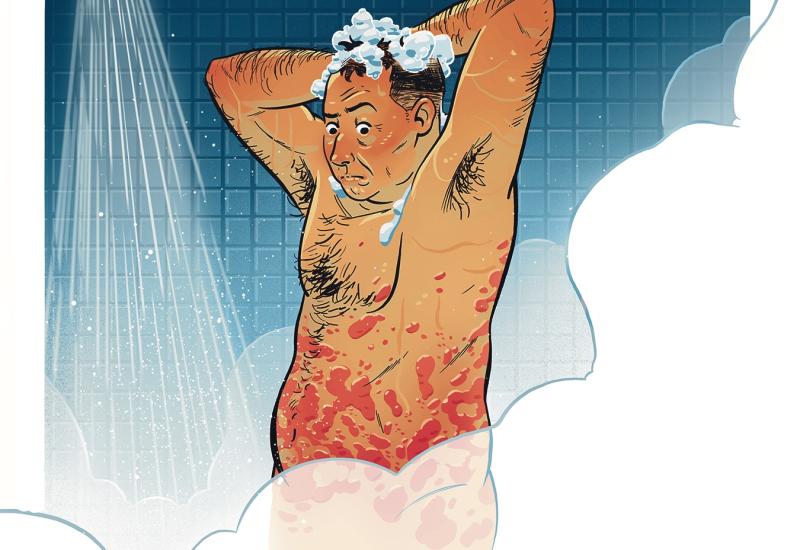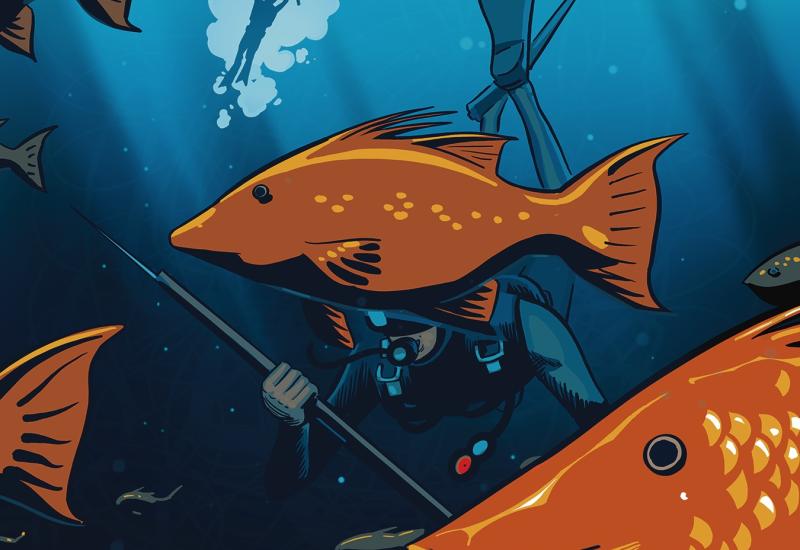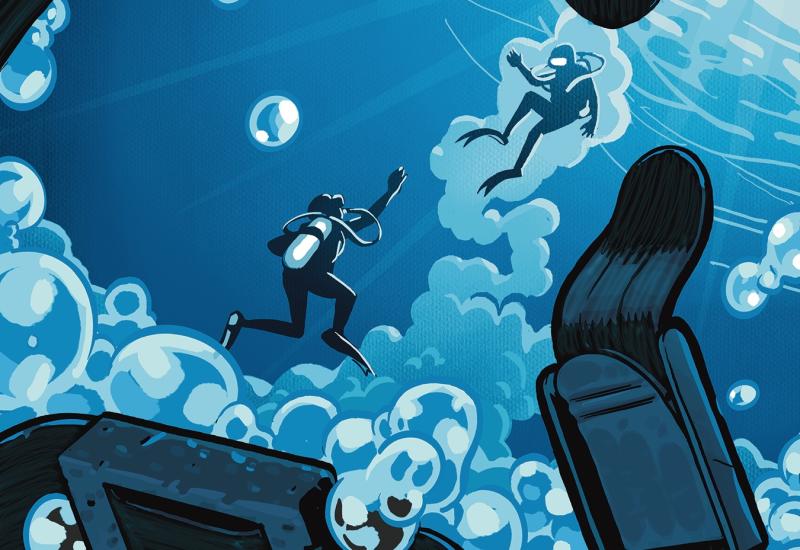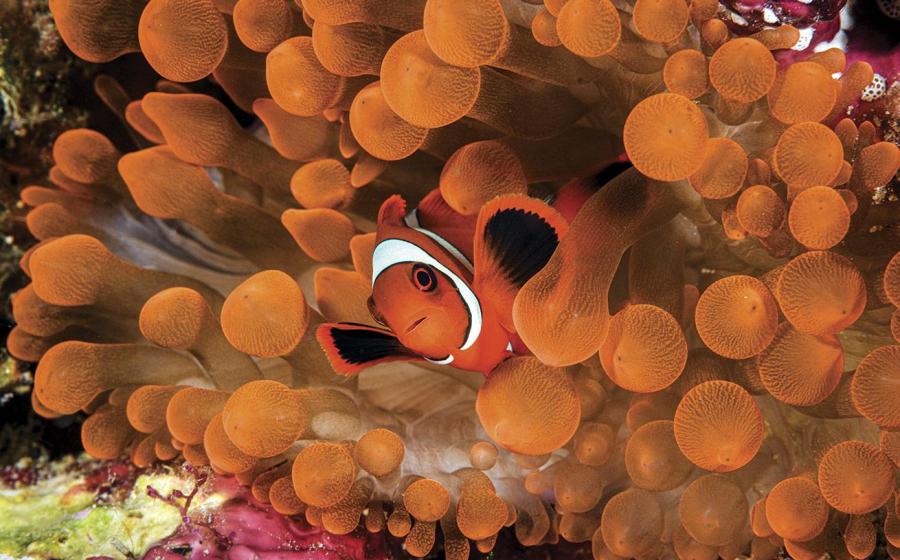Lessons for Life: Lose Your Focus, Lose Your Life

Lessons for Life
Getting caught up in the moment turns a son’s first ocean dive into his father’s last. Check out July's Lesson for Life and learn how losing focus on yourself during a dive, even under the best of intentions, can result in you losing your life.
Jori Bolton
Ed couldn’t be more proud. He had learned to dive a couple of years before, and had 20 dives to his credit. As soon as he earned his certifcation, Ed had known it was something he wanted to share with his son. Leo had been busy finishing high school and starting college, but he had managed to earn his open-water certification.
They had dived together in the local quarry, but Ed hadn’t had a chance to take his son to the ocean until today. He was having a blast watching his son’s eyes as Leo explored the wreck below them. He could tell Leo was excited about everything he saw, and knew the young man was hooked. Ed was thinking to himself how great it was that he had a new dive buddy, and could share the underwater world with his son.
Then he took a breath, and almost nothing came through his regulator.
THE DIVERS
Ed was 48 years old. Leo was 19 and had just finished his freshman year of college. Ed had only an open-water certifcation, but he was thinking of taking additional training now that Leo was a diver. He hoped they’d become dive instructors together and lead dive trips around the world. He couldn’t wait.
THE DIVE
There was a light surface current and 2- to 3-foot seas as Ed and Leo got ready to make their first dive on the shipwreck, one of Ed’s favorite dives. As the divemaster gave the briefng and told them what to expect, both divers got more and more excited. Leo was a little nervous. He hadn’t dived since the previous summer but had refreshed himself using his training-course materials.
Ed reassured Leo that he would be right beside him the entire dive, and showed him the pony bottle attached to Ed’s main scuba cylinder in case one of them ran low on air. Ed had bought it a few weeks before, wanting an extra margin of safety since he was diving with his son. Ed stayed slightly above and behind his son once they made it to the deck of the wreck at 91 feet. He wanted to be in a position to watch out for Leo — and to watch Leo have the time of his life.
Throughout the dive, Leo checked his air supply regularly. He didn’t want to get in trouble on his frst ocean dive. Every few minutes, he glanced at his gauges and was reassured that he was in good shape. There was a stronger current at depth than at the surface, but Leo stayed close to the wreck structure and didn’t have to work too hard to maintain his position.
THE ACCIDENT
It took Ed a moment to figure out what was wrong with his regulator. The current was moving quickly across the deck, and he was swimming hard to stay above Leo. Ed felt as if his regulator was barely keeping up — then all of a sudden, it wasn’t keeping up at all. Ed looked at his air-pressure gauge and realized it was showing zero. Ed quickly tapped his son on the shoulder, giving him the out-of-air and ascend signals. Ed began swimming as fast as he could toward the anchor line, knowing Leo would follow.
Ed ascended as he swam, reaching the anchor line at around 45 feet. He got a few sips of air from his tank as the ambient pressure decreased. In his panic, he mostly held his breath, trying to save what he had in his lungs for the swim.
At around 20 feet, Ed remembered his pony bottle, steadied himself and grabbed the extra regulator, taking a deep breath. His breathing was rapid, but he slowly got things under control as Leo joined him and they completed their safety stop, although Ed signaled Leo that he felt “funny.” They surfaced and made their way to the dive boat’s ladder. Ed insisted that his son go up the ladder first. Leo started to argue, but decided to board so he could let the divemaster know his dad was in trouble. Ed started to climb out of the water and collapsed on the swim step, falling onto his face and losing consciousness. The diveboat crew grabbed Ed and pulled him the rest of the way into the boat. They pulled his dive gear off and began CPR.
Ed never regained consciousness.
ANALYSIS
Ed was more worried about his son on this dive than he was about himself. His good intentions put both of them at risk, and cost Ed his life. In an emergency, panic narrows a diver’s options to what he or she has reviewed and practiced. Ed had bought a pony bottle but had never used it or even thought much about what to do with it. In his panic after running out of air at depth, the only thing Ed thought of was fleeing toward the surface. He didn’t think of using his son’s alternate air source, or using the alternate air source he was carrying for just such a situation.
For any emergency procedure to be effective, you have to practice it regularly. Ed and Leo should have discussed what they would do in the event of an emergency, and practiced using the pony-bottle regulator. They could have done this on the dive boat or on the bottom as soon as they reached the wreck, before they began their exploration. (Safety stops can be a great place to practice emergency drills. You have a few moments to do nothing but breathe, so why not practice skills like mask removal and replacement, regulator recovery and alternate-air-source breathing? It’s a good idea to brief your dive buddy first on your plans so you don’t scare him underwater.)
In Ed’s case, an autopsy showed the presence of intravascular and intracardiac gas. In other words, he had bubbles in his circulatory system and heart, suggesting an arterial gas embolism. Ed panicked and held his breath while he ascended. He continued to inhale from his regulator but didn’t exhale the expanding gas. Only when he reached safety-stop depth did he calm down enough to breathe from the pony bottle. The ascent from 90 feet to 20 feet was more than enough drop in pressure to create the embolism.
Ultimately, even though Ed’s reaction is what killed him, the basic problem was avoidable. If he had monitored his gas and been aware that he was working harder at depth because of the position he chose to make the dive in — above his son, subject to the stronger current — the issue could have been averted. All Ed had to do was dive beside his buddy rather than trying to take care of the younger diver, and signal that they needed to ascend when he realized his pressure gauge was in the red.
If either of those things had happened, father and son could have enjoyed a long diving career together.
Lessons for Life:
1) Practice with new equipment to be comfortable with it when you need it.
2) Regularly rehearse rescue skills in the water to make sure you are prepared for an emergency.
3) Monitor your own gas supply, and be prepared to call the dive when your air supply is getting low.
4) Stay out of currents_ on a dive to avoid working hard and consuming your gas supply more quickly.
5) Don’t assume a position where you have to "take care" of another diver, unless you are a dive professional and you are teaching a class. In that case, you are prepared to be the one who does the rescuing in an emergency.
More Lessons for Life:
One-Way Trip to the Bottom | Pride Can Be Deadly | Disobedience Spells Disaster

Jori BoltonGetting caught up in the moment turns a son’s first ocean dive into his father’s last. Check out July's Lesson for Life and learn how losing focus on yourself during a dive, even under the best of intentions, can result in you losing your life.
Ed couldn’t be more proud. He had learned to dive a couple of years before, and had 20 dives to his credit. As soon as he earned his certifcation, Ed had known it was something he wanted to share with his son. Leo had been busy finishing high school and starting college, but he had managed to earn his open-water certification.
They had dived together in the local quarry, but Ed hadn’t had a chance to take his son to the ocean until today. He was having a blast watching his son’s eyes as Leo explored the wreck below them. He could tell Leo was excited about everything he saw, and knew the young man was hooked. Ed was thinking to himself how great it was that he had a new dive buddy, and could share the underwater world with his son.
Then he took a breath, and almost nothing came through his regulator.
THE DIVERS
Ed was 48 years old. Leo was 19 and had just finished his freshman year of college. Ed had only an open-water certifcation, but he was thinking of taking additional training now that Leo was a diver. He hoped they’d become dive instructors together and lead dive trips around the world. He couldn’t wait.
THE DIVE
There was a light surface current and 2- to 3-foot seas as Ed and Leo got ready to make their first dive on the shipwreck, one of Ed’s favorite dives. As the divemaster gave the briefng and told them what to expect, both divers got more and more excited. Leo was a little nervous. He hadn’t dived since the previous summer but had refreshed himself using his training-course materials.
Ed reassured Leo that he would be right beside him the entire dive, and showed him the pony bottle attached to Ed’s main scuba cylinder in case one of them ran low on air. Ed had bought it a few weeks before, wanting an extra margin of safety since he was diving with his son. Ed stayed slightly above and behind his son once they made it to the deck of the wreck at 91 feet. He wanted to be in a position to watch out for Leo — and to watch Leo have the time of his life.
Throughout the dive, Leo checked his air supply regularly. He didn’t want to get in trouble on his frst ocean dive. Every few minutes, he glanced at his gauges and was reassured that he was in good shape. There was a stronger current at depth than at the surface, but Leo stayed close to the wreck structure and didn’t have to work too hard to maintain his position.
THE ACCIDENT
It took Ed a moment to figure out what was wrong with his regulator. The current was moving quickly across the deck, and he was swimming hard to stay above Leo. Ed felt as if his regulator was barely keeping up — then all of a sudden, it wasn’t keeping up at all. Ed looked at his air-pressure gauge and realized it was showing zero. Ed quickly tapped his son on the shoulder, giving him the out-of-air and ascend signals. Ed began swimming as fast as he could toward the anchor line, knowing Leo would follow.
Ed ascended as he swam, reaching the anchor line at around 45 feet. He got a few sips of air from his tank as the ambient pressure decreased. In his panic, he mostly held his breath, trying to save what he had in his lungs for the swim.
At around 20 feet, Ed remembered his pony bottle, steadied himself and grabbed the extra regulator, taking a deep breath. His breathing was rapid, but he slowly got things under control as Leo joined him and they completed their safety stop, although Ed signaled Leo that he felt “funny.” They surfaced and made their way to the dive boat’s ladder. Ed insisted that his son go up the ladder first. Leo started to argue, but decided to board so he could let the divemaster know his dad was in trouble. Ed started to climb out of the water and collapsed on the swim step, falling onto his face and losing consciousness. The diveboat crew grabbed Ed and pulled him the rest of the way into the boat. They pulled his dive gear off and began CPR.
Ed never regained consciousness.
ANALYSIS
Ed was more worried about his son on this dive than he was about himself. His good intentions put both of them at risk, and cost Ed his life. In an emergency, panic narrows a diver’s options to what he or she has reviewed and practiced. Ed had bought a pony bottle but had never used it or even thought much about what to do with it. In his panic after running out of air at depth, the only thing Ed thought of was fleeing toward the surface. He didn’t think of using his son’s alternate air source, or using the alternate air source he was carrying for just such a situation.
For any emergency procedure to be effective, you have to practice it regularly. Ed and Leo should have discussed what they would do in the event of an emergency, and practiced using the pony-bottle regulator. They could have done this on the dive boat or on the bottom as soon as they reached the wreck, before they began their exploration. (Safety stops can be a great place to practice emergency drills. You have a few moments to do nothing but breathe, so why not practice skills like mask removal and replacement, regulator recovery and alternate-air-source breathing? It’s a good idea to brief your dive buddy first on your plans so you don’t scare him underwater.)
In Ed’s case, an autopsy showed the presence of intravascular and intracardiac gas. In other words, he had bubbles in his circulatory system and heart, suggesting an arterial gas embolism. Ed panicked and held his breath while he ascended. He continued to inhale from his regulator but didn’t exhale the expanding gas. Only when he reached safety-stop depth did he calm down enough to breathe from the pony bottle. The ascent from 90 feet to 20 feet was more than enough drop in pressure to create the embolism.
Ultimately, even though Ed’s reaction is what killed him, the basic problem was avoidable. If he had monitored his gas and been aware that he was working harder at depth because of the position he chose to make the dive in — above his son, subject to the stronger current — the issue could have been averted. All Ed had to do was dive beside his buddy rather than trying to take care of the younger diver, and signal that they needed to ascend when he realized his pressure gauge was in the red.
If either of those things had happened, father and son could have enjoyed a long diving career together.
Lessons for Life:
1) Practice with new equipment to be comfortable with it when you need it.
2) Regularly rehearse rescue skills in the water to make sure you are prepared for an emergency.
3) Monitor your own gas supply, and be prepared to call the dive when your air supply is getting low.
4) Stay out of currents_ on a dive to avoid working hard and consuming your gas supply more quickly.
5) Don’t assume a position where you have to "take care" of another diver, unless you are a dive professional and you are teaching a class. In that case, you are prepared to be the one who does the rescuing in an emergency.
More Lessons for Life:
One-Way Trip to the Bottom | Pride Can Be Deadly | Disobedience Spells Disaster










